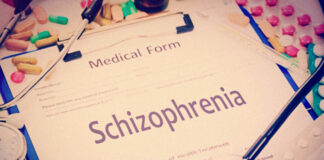Tag: antipsychotic drugs
Many Service Users Interested in Decreasing Antipsychotic Use with Professional Help
New research examines service user attitudes on discontinuing and reducing antipsychotic drugs.
Robert Whitaker Refutes Jeffrey Lieberman; But Is Psychiatry Reformable?
When the neuroleptics-are-necessary-to-treat-schizophrenia myth falls, psychiatry is finished. And that is why the Goff et al paper was produced: a desperate attempt to maintain its position by a profession that is truly on the ropes. For psychiatry this is a death-struggle.
Breaking Through the Wall of Schizophrenia
A good relationship can begin to puncture a hole through the wall of disconnection. The goal is to help a person break out of the isolation and private world that trauma has created and re-engage with a public world—culturally, emotionally and in a way that has personal meaning.
Behind Every Label
In my case, an uninformed diagnosis resulted in a near lifetime of mistreatment and misunderstanding. How does one account for such a significant error? Having my diagnosis changed has felt very liberating, but it hasn’t much reduced the effect of the stigma I’ve internalized.
Psychiatry Defends Its Antipsychotics: A Case Study of Institutional Corruption
Jeffrey LIeberman and colleagues have published a paper in the American Journal of Psychiatry stating that there is no evidence that psychiatric drugs cause long-term harm, and that the evidence shows that these drugs provide a great benefit to patients. A close examination of their review reveals that it is a classic example of institutional corruption, which was meant to protect guild interests.
Eternal Sorrow: My Unexpected Descent into the Mental Health System
In searching for answers as to what went wrong with my treatment, my family and I discovered that there is already much scientific evidence demonstrating the dangers of antipsychotic medications and why they should not be used to treat illnesses such as Tourette Syndrome.
Sir Robin Murray and Our Collective Mea Culpa
Sir Robin Murray, a distinguished British professor of psychiatry, recently published a paper in Schizophrenia Bulletin titled, “Mistakes I Have Made in My Research Career.” I wonder what leads Robin Murray to acknowledge his mistakes when others seem to hunker down. I also wonder how I can know when I am misled in my assumptions.
Rejecting the “Medications for Schizophrenia” Narrative: Part II
In this second article, I will further analyze the reasons why the unevidenced biological-illness approach to “schizophrenia” has become so entrenched in our society. Most importantly, I will discuss hopeful alternatives.
Rejecting the “Medications for Schizophrenia” Narrative: A Survivor’s Response to Pies...
As a psychiatric survivor who has personally experienced severe psychosis, my criticisms focus on the relative lack of attention to what psychiatric drugs actually are, and on the uncertain, contested nature of the supposed target of these drugs: “schizophrenia.” I will elaborate on each of these points with references, as well as highlighting alternative approaches to helping psychotic people.
Study Finds Improved Functioning for ‘Schizophrenia’ Without Antipsychotics
Long-term treatment with antipsychotic drugs is currently considered the standard treatment for patients diagnosed with ‘schizophrenia.’ A new study challenges this practice, however. The...
Moving Forward in the Science of Psychiatric Medication Discontinuation/Reduction
This week Live & Learn launched a research study on the experience of people labeled with mental disorders who have tried to stop taking psychiatric medications. This project -- the Psychiatric Medication Discontinuation/Reduction (PMDR) Study -- aims to understand the process of coming off psychiatric medications in order to better support those who choose to do so. The study seeks to answer the question: What helps people stop their psychiatric medications? What gets in the way of stopping?
New Study Examines Successful Discontinuation of Antipsychotics
A new study to be published in the next issue of Schizophrenia Research examines patients suffering from a first-episode of psychosis who stop taking any antipsychotic drugs. The researchers attempt to identify variables that can serve as predictors of the successful discontinuation of antipsychotics. They find, for example, that those who discontinue the drugs have, on average, the same outcomes as those who stay on them, and that those who have better social integration are more likely to discontinue without relapse.
Timberrr! Psychiatry’s Evidence Base For Antipsychotics Comes Crashing to the Ground
When I wrote Anatomy of an Epidemic, one of my foremost hopes was that it would prompt mainstream researchers to revisit the scientific literature. Was there evidence that any class of psychiatric medications—antipsychotics, antidepressants, stimulants, benzodiazepines, and so forth—provided a long-term benefit? Now epidemiologists at Columbia University and City College of New York have reported that they have done such an investigation about antipsychotics, and their bottom-line finding can be summed up in this way: Psychiatry’s “evidence base” for long-term use of these drugs does not exist.
Researchers Test Harms and Benefits of Long Term Antipsychotic Use
Researchers from the City College of New York and Columbia University published a study this month testing the hypothesis that people diagnosed with schizophrenia treated long-term with antipsychotic drugs have worse outcomes than patients with no exposure to these drugs. They concluded that there is not a sufficient evidence base for the standard practice of long-term use of antipsychotic medications.
On Relaxing Off-Label Meds: Do the Opposite. Especially for Children. Especially Antipsychotics
The US Food and Drug Administration has announced that there will soon be a public meeting to explore providing drug companies with greater flexibility in promoting off-label indications to doctors. When it comes to prescribing medications to children, and particularly psychiatric medications, this is a bad idea. I write both as a former consultant to the pharmaceutical industry, and as a father who lost a son to the toxic effects of antipsychotics prescribed off-label.
“Study: Kids with ADHD taking strong drugs with major side effects”
Fox 5 Atlanta featured a back to school story about the growing percentage of preteens and teens being prescribed antipsychotic medication for ADHD. They report:...
Dyskinesia, Dissociation, and the Long Term Consequences of “Antipsychotic” Drugs
I recently receive a tweet from Intervoice, that said “This is a odd research finding in my view, what do you think? http://fb.me/L9cs3NTR”
Curious, I...


















